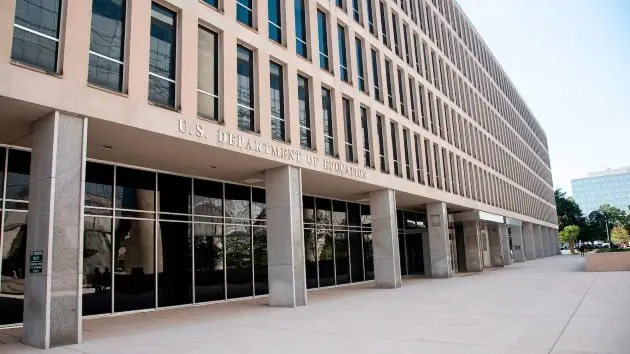(WASHINGTON) — While the U.S. Department of Education cannot be dissolved completely under the law, the Supreme Court’s decision on Monday to lift an injunction against the Trump administration’s efforts to gut the agency took the first step in that direction — a move that could ripple to students around the country.
The Supreme Court’s decision, for now, allows the Trump administration to fire hundreds of employees who had been on paid administrative leave for months to officially be let go. The layoffs are supposed to take effect in August, according to internal Education Department emails obtained by ABC News, right as many of the nation’s schools return for a new school year.
The ruling allows the massive reduction in force to deliver on President Donald Trump’s mission to reduce fraud, waste, abuse and spending within the federal government — and return education power and decisions back to the states.
But what does this mean for America’s students?
Former Department of Education employees and education advocates told ABC News that they worry this ruling could harm the most vulnerable children in the country.
“This isn’t just about jobs,” former teacher and Department of Education liaison Dani Pierce told ABC News in a statement, adding “it’s about abandoning the people and programs that protect students’ rights, support educators and ensure equity in schools across the country.”
The Education Department, the smallest cabinet-level agency, was put in place to safeguard disadvantaged students, aiding them with financial support and civil protections, advocates say. By reducing the size and scope of the agency — now leaving it with about half of its staff — experts and advocates tell ABC News that disadvantaged students are at risk.
“The U.S. Supreme Court have dealt a devastating blow to this nation’s promise of public education for all children,” Skye Perryman, president and CEO of left-leaning Democracy Forward — a public education advocacy nonprofit — said in a statement to ABC News. “We will aggressively pursue every legal option as this case proceeds to ensure that all children in this country have access to the public education they deserve.”
The department’s main responsibilities of administering the $1.6 trillion federal student loan portfolio and assisting low-income and disabled youth will likely be impacted the most, Education Department sources tell ABC News.
Rachel Gittleman, a management and program analyst formerly of the Education Department’s Ombudsman Office, told ABC News that her position was a backstop for the Federal Student Aid (FSA) office. After Monday’s ruling, Gittleman warned student loan borrowers may not receive the same support.
“I think it makes repayment of student loans even harder than it already was,” she said. “It makes these systems, the federal student loan system, which is already a largely dysfunctional and broken system to begin with — I think it makes those harms even greater.”
However, Secretary of Education Linda McMahon said the department will help employees impacted by the cuts find new jobs and rehome different statutory functions of the agency, including student loans to treasury and funding for students with disabilities to the Department of Health and Human Services. McMahon has also said that no statutory funding the agency administers will be cut.
The Supreme Court’s decision was welcome news to many in the education community.
Tiffany Justice, chair of the Parental Rights Initiative at The Heritage Foundation, has been a leading voice in the conservative movement to bolster the Trump administration’s argument.
Justice called the ruling “fantastic news” that is putting parents back into the driver’s seat of education decisions.
“Can’t wait for @EDSecMcMahon to be able to unleash the full power of reform on the bloated, inefficient, bureaucracy at @usedgov,” Justice said in a post on X on Monday.
Neal McCluskey, an education analyst at libertarian think tank Cato Institute, is also a staunch supporter of abolishing the agency. He took a victory lap on Monday.
“There is nothing unconstitutional about the executive branch trying to execute the law with fewer people,” McCluskey wrote in a statement to ABC News. “The administration should certainly work to eliminate the unconstitutional, wasteful Department of Education, but if it had wanted to do that unilaterally, it would have fired everyone.”
Meanwhile, conservative education leaders such as Wyoming State Superintendent of Public Instruction Megan Degenfelder have long said that the federal government should not have a role in education.
She told ABC News that underserved student services can be transferred to other departments and stressed that in Wyoming their priorities “are the same as President Trump’s priorities.”
“I do not see a place for the U.S. Department of Education to exist now,” Degenfelder said in an interview with ABC News.
“Our founding fathers designed our country, our government, in a way that states would have the ultimate authority when it comes to education.”
Copyright © 2025, ABC Audio. All rights reserved.

